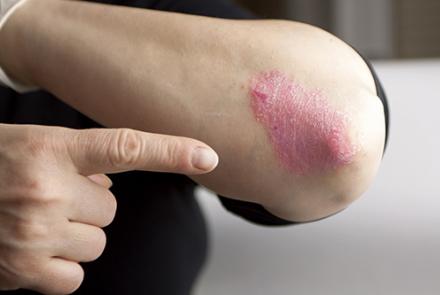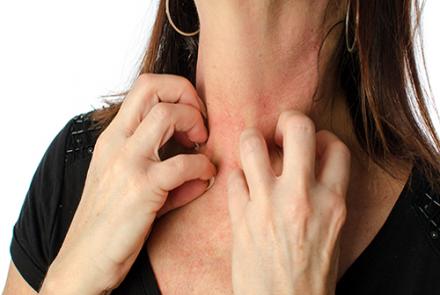
Allergies are the most common cause of skin problems. They vary in symptoms and severity - from mild to life threatening. Dr. Shital Patel gives an overview of skin allergies to help you identify and treat common skin problems.
1. What is an allergy?
An allergy is a hypersensitive immune response by the body towards any substance that may have entered or come in contact with the body. Any such substance that causes an allergic reaction is called an Allergen.
Common symptoms include:
- Sneezing continuously.
- Runny nose due to excess mucus formation & secretions.
- Cough usually dry.
- Hives or a rash
- Wheezing
- Difficulty in breathing
- Swelling
- Itching
- Nausea or vomiting
- Bloating and flatulence
- Diarrhea
2. What is anaphylactic shock?
Anaphylaxis is the most severe reaction to an allergen that can be life-threatening. It is a rapid response that can present with severe swelling, hives, low blood pressure, dilated blood vessels, difficulty breathing etc.
3. What are all the causes of a skin allergy?
Well sometimes, during an exposure to a substance the body marks it as an invader and makes an IgE antibody against it. On exposure the next time, the antibodies trigger production of mast cells that initiate the allergy symptoms in the nose, skin, lungs and the GI system.
Common causes of allergies are:
- Food items such as nuts, dairy, gluten, etc.
- Dust mites.
- Animal or pet dander.
- Mold or fungal growth.
- Pollen count in the air.
- Insect bites especially bees, wasps, mosquitoes etc.
- Certain medications that cause counter reactions.
- Certain chemicals such as Balsam of Peru, perfumes, hair dyes or cosmetic products.
- Metals commonly due to nickel.
- Sun rays.
- Plants such as poison oak or poison ivy.
4. Are allergies inherited?
Not necessarily! In certain families, there are more member who suffer from allergies.. If both parents suffer from allergies, there seem to be a higher tendency for the child to develop allergies too. Such high risk children or individuals are called Atopic! However, this has not been a predictable factor because children from non-allergic families have also known to suffer from allergies.
5. What is the most common types of rash?
Most common rashes include eczema, granuloma annulare, pityriasis rosea and lichen planus.
6. Can Illness or an infection cause skin rash?
Several viral infections can cause a rash accompanied by other symptoms. Some viruses such as Chicken pox and measles cause a typical rash that is easily diagnosed, while others may not be characteristic of any specific virus. The rash on its own is not considered serious and usually subsides with time and treatment.
7. Can skin rashes be life-threatening?
Certain serious diseases do cause a skin rash that is the primary symptom and must be addressed immediately. The rash presents with blisters affecting both the skin and the mucous membranes such as mouth, genitals & eyes. Such diseases include Stevens-Johnson syndrome (SJS), pemphigus vulgaris (PV), toxic epidermal necrolysis (TEN), Toxic shock syndrome (TSS), Scalded skin syndrome etc.
8. What are the types of skin allergy?
- Contact Dermatitis
- Atopic dermatitis
- Urticaria
- Latex allergy
9. What is Contact Dermatitis?
Contact dermatitis is a rash that occurs when one comes in contact with an irritant or allergen. Such allergens include plants such as cosmetics, toiletries, perfumes, jewellery, plants like poison ivy etc. The rash is often described as red, itchy, scaly, weepy and burning.
There are two types of Contact dermatitis:
- Irritant Contact dermatitis is when the skin comes in direct contact with an irritant such as a chemical, plant etc.
- Allergic Contact dermatitis is when the skin comes in contact with an allergen for the second time causing the immune system to react.
10. What is Atopic Dermatitis or Eczema?
Atopic eczema or dermatitis is when the condition occurs in individuals who have a family history of allergies. Family history is important for such a diagnosis.
11. What is Urticaria or hives?
Urticaria or hives are round red weals that appear on the skin accompanied by swelling and itching. The itching may be aggravated by scratching, intake of alcohol, sweating during exercising, anxiety, etc.. If hives last for more than 6 week, they are considered chronic. If the cause is unidentifiable, then the condition is termed Idiopathic chronic urticarial! Beware that urticaria can also be due to immune disease, thyroid or other hormonal problems and even cancer in rare cases.
Types of Urticaria:
- Solar where the trigger is sun rays. Hives can appear within minutes of exposure.
- Pressure or constriction due to tight clothing, belts or soles of feet that have constant pressure. Long hours of constriction can cause red welts.
- Increased body temperature during sweating, exercising, anxiety, stress/fear, hot baths or showers etc can trigger redness and inflammation.
- Physical irritation due to rubbing or scratching can cause symptoms at the site.
- Exposure to outside low temperatures during cold weather conditions can often cause severe reactions.
12. How severe is Latex allergy?
Repeated exposure to latex products such as balloon, gloves etc is known to trigger an allergic reaction in many people. The reaction can include wheezing, tightness in the chest, difficulty breathing etc. The powder found in most latex gloves is known to cause such a reaction even when it’s airborne.
13. How are allergies tested?
Most allergies are tested via a physical examination, skin prick, patch or blood test.
14. How is skin prick testing done?
The skin prick testing or SPT is a quick and simple test that provides results within minutes. Up to 25 allergens can be tested on the arm, back or thigh of the patient. The allergens are dropped on the skin and marked by a marker. The skin is then pricked by a lancet at the site of the drop. Control samples are also used to check that the test is working. After a few minutes, positive or negative reactions may occur which are noted.
15. How is patch testing done?
Patch testing is usually done to investigate causes of skin conditions such as dermatitis, eczema etc. Allergens in chemical form are applied on a disc, which are then taped on the back of the patient. It is important that the skin area tested be clear (devoid of any rash) and not have any steroid cream used on it. More than 100 different chemicals can be tested. The patches may be left on the skin for 48 hours and then checked for results.
16. How can an allergist help?
An allergist can help diagnose your skin condition and what your allergens are. The Allergist can review your history and evaluate the best treatment options for you. Treatment options will include H1 or H2 antihistamines and steroids. Infections will require antibiotic or antifungal medications. Skin conditions are commonly treated with topical ointments.
17. Can I outgrow my allergy?
Many people who develop allergies as children have noticed that their allergies fade away with age or there is a change in their response as they get older. Such changes can be a consequence of some adjustment in the immune system. Responses have been seen to change from season to season and from allergen to allergen. The exact cause of allergies vanishing or reducing or even re-emerging is still unknown.
18. What is allergy immunotherapy?
Immunotherapy is a way to change the reaction of the immune system so that it no longer attacks allergens. This is done by a method of desensitisation, which means the immune system is knowingly exposed to the allergen over time till the response changes. This involves regular injections, sprays, sublingual drops or tablets of the allergen the person is sensitised to, over a period of time. Currently this therapy is considered effective for patients who suffer from hay fever, animal pet dander allergies and those have severe reactions to bee and wasp stings.










